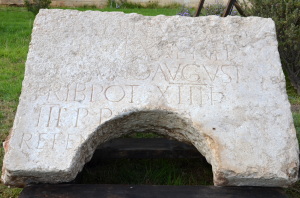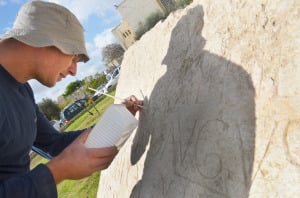A unique archaeological find sheds light on one of Jerusalem’s darkest periods.

The inscription. (Photo: Yoli Shwartz/IAA)
An exceptional archeological find considered to be of tremendous historical significance was discovered in Jerusalem: a segment of a stone engraved with an official Latin inscription dedicated to the Roman emperor Hadrian, who ruthlessly suppressed the famous Bar-Kokhba rebellion in 135 CE. Researchers believe this is among the most important Latin inscriptions ever discovered in Jerusalem.
Over the past year the Israel Antiquities Authority (IAA) has conducted salvage excavations in several areas north of the Damascus Gate in the Old City of Jerusalem. A stone section bearing an official Latin inscription from the Roman period was recently discovered in the area.
“We found the inscription incorporated into the opening of a deep cistern. In antiquity, as today, it was customary to recycle building materials and the official inscription was evidently removed from its original location and integrated in a floor for the practical purpose of building the cistern,” Dr. Rina Avner and Roie Greenwald, excavation directors on behalf of the IAA, said in a joint statement.
Upon finding the inscription, it became clear to the excavators that they had uncovered an especially significant discovery, as indicated by the size and clarity of the letters. Even after 2,000 years the inscription is in an impressive state of preservation.
Completing the Puzzle
The inscription, consisting of six lines of Latin text engraved on hard limestone, reads: “To the Imperator Caesar Traianus Hadrianus Augustus, son of the deified Traianus Parthicus, grandson of the deified Nerva, high priest, invested with tribunician power for the 14th time, consul for the third time, father of the country (dedicated by) the 10th legion Fretensis (2nd hand) Antoniniana.”
According to the translators, “This inscription was dedicated by Legio X Fretensis to the emperor Hadrian in the year 129/130 CE.”
An analysis shows that the fragment of the inscription revealed by the archaeologists is none other than the right half of a complete inscription, the other part of which had been discovered nearby in the late 19th century and published by a preeminent French archaeologist. That stone is currently on display in the courtyard of Studium Biblicum Franciscanum Museum in the Old City of Jerusalem.
The inscription may have been made in honor of Hadrian’s visit to the region. The completion of both parts of the text reveals an especially large inscription that is quite impressive. According to Dr. Avner, “The inscription itself might have set in the top of a free-standing triumphal arch on the city’s northern boundary such the Arch of Titus in Rome.”
Battle for Identity
Only a small number of ancient official Latin inscriptions have been discovered in archaeological excavations throughout Israel, and in Jerusalem in particular, and the IAA says there is no doubt that this is among the most important. The significance of the inscription stems from the fact that it specifically mentions the name and titles of Hadrian, who was an extremely prominent emperor, as well as a clear date. The latter is a significant and tangible confirmation of the historical account regarding the presence of the Tenth Legion in Jerusalem during the period between the two revolts, and possibly even the location of the legion’s military camp in the city, as well as one of the reasons for the outbreak of the Bar Kokhba revolt several years later and the establishment of ‘Aelia Capitolina’.

Preserving the unique find. (Photo: Yoli Shwarz/IAA)
The events of the Bar Kokhba revolt are ascribed to the reign of the emperor Hadrian. Bar Kokhba led the remnants of the Jewish population residing in Judea against the Roman occupation. Bar Kokhba attained a measure of self rule for a few years, but was subsequently crushed by Hadrian’s legioners. Hadrian is remembered in Jewish history for having issued decrees imposing persecution and forced conversion on Jews, which sources refer to as the ‘Hadrianic decrees’. Hadrian’s primary objective was to obliterate Jewish identity.
The fate of Jerusalem following the destruction of the Second Temple (70 CE) and prior to the Bar Kokhba revolt (132-136 AD) is one of the major issues in the history of the city and in terms of the Jewish people’s connection to it.
We know from ancient writers and from the inscriptions on coins that the new city that Hadrian established was granted the status of colonia (that is, a city whose citizens and gods are Roman) and its name was changed to Aelia Capitolina. Hadrian renamed Jerusalem in an attempt to erase its Jewish identity and as part of his campaign to suppress Jewish nationalism.That name incorporates within it the emperor’s name that is in the inscription, whose full name is Publius Aelius Hadrianus, and Rome’s main family of deities.
Settling an Historical Question?
There is no doubt that the discovery of this inscription will contribute greatly to the longstanding question about the events leading to the outbreak of the Bar Kokhba revolt. Were the construction of Aelia Capitolina and the establishment of the pagan temple on the site of the Jewish Temple Mount the reasons for the rebellion? Or perhaps these actions by Hadrian were the results of the revolt – that is, punitive action taken by Hadrian against those who had rebelled against Roman rule.
Author: United with Israel Staff
Send Passover Packages to Needy Israeli Soldiers - Bring Them Joy!
We are honored to thank the young men and women of the IDF who risk their lives every day to protect the citizens of Israel. Since October 7th, soldiers have been on the battlefield for months - many are hoping to come home for Passover.
Join us in sending Passover food packages (and personal notes) to Israeli soldiers and their families.
Many soldiers spend the Passover holiday with needy families back home. The soldiers greatly appreciate your love and concern. Bring them Passover joy!
CLICK HERE TO SEND YOUR PACKAGE AND NOTE TO ISRAELI SOLDIERS!



